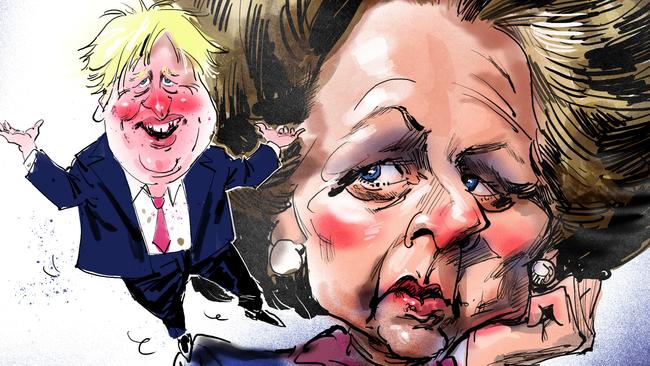
In any event, we are witnessing the decline of the British Conservative Party. David Cameron was an effective prime minister until he blundered by holding a referendum on EU membership and resigned after failing to carry the remain vote. While Theresa May’s resilience was respected, she lacked authority after losing her parliamentary majority and could not deliver Brexit. They are largely responsible for the mess Britain is in today.
Johnson, Hunt, May and Cameron are a long way from the leadership offered by Margaret Thatcher, who ruled for 11 years and won three elections. The Conservative Party is a shadow of what it was and the prime ministership has been diminished. (The British Labour Party, make no mistake, is also a shadow of what it was and is saddled with a hopeless leader in Jeremy Corbyn.)
Bernard Ingham, 87, who served as Thatcher’s press secretary, says she would be appalled by what has happened to the Conservative Party. “God knows, what do we all make of it?” he told this column in an exclusive interview. “The Tory party was always Thatcher’s worst enemy. They got rid of her and now they’ve got rid of May, quite ruthlessly. They haven’t changed.”
Ingham, known for his brusque manner as a press secretary and journalist, is not all that enthusiastic about the likely next prime minister. “Johnson will move heaven and earth to get us out of Europe,” he says. “But I don’t know how he will perform after that because, like all old Etonians, he’s a bit soft socially. So, there are a lot of questions about him. But he wants to get us out of Europe and that, frankly, is the most important thing.”
Johnson’s clownish antics, ill-discipline and bumbling explanations of policy would be anathema to Thatcher. There is much he can learn from the Iron Lady about how she approached the prime ministership, even though her policy record was mixed.
“Thatcher’ greatest quality was that she didn’t want to be loved but wanted to be respected,” Ingham says. “If more politicians sought respect rather than love, we would have a hell of a lot better democracy. She also knew what she believed in, had given thought as to how to implement decisions and prepared herself for setbacks. But once she took a decision she didn’t easily change it. She had an iron will and enormous guts. A lot of politicians today have brains but they don’t have any guts to carry through their policies.”
Ingham and Thatcher were from outside the establishment, disciplined and hardworking, and welcomed debate before settling on a course of action. “It puzzles me that people say she never listened,” he says. “I never had any difficulty in getting her to listen. What I sometimes had difficulty with was trying to get her to do what I thought she ought to do.”
Thatcher did not read newspapers so Ingham prepared daily summaries of the news. This was a mistake, he argues, because politicians must be aware of how policies are being presented to voters. “She would say get the policy right and the politics will take care of itself, which was nonsense, and I reminded her of that when the poll tax came along,” he recalled.
It is difficult to know whether Thatcher would have supported Brexit. Ingham says she never suggested Britain should leave the EU. Nor would she have supported putting a question of such importance to a referendum. Thatcher would have “fought Europe tooth and nail” for a better deal. But Ingham suspects Thatcher would have sympathised with Brexit if the EU remained immovable.
Thatcher warned about the increasing dominance of Europe in a landmark speech in Bruges in 1988. It outlined a vision for a different Europe and is now regarded by some as a turning point.
“I don’t think there would have been Brexit now if Europe had heeded what she said about the dangers of an ever-closer union,” Ingham suggests.
Rarely does a political leader depart at a time of their own choosing. Thatcher’s demise is chronicled in Ingham’s diaries, The Slow Downfall of Margaret Thatcher (NewSouth Publishing). It provides a fascinating insider view of her prime ministership as it cascaded towards its bitter end.
Ingham argues that several things contributed to Thatcher’s downfall — the poll tax, disagreements over Europe, high inflation and unemployment — but in the end it was her arrogance and defiance, and bullying of ministers, that resulted in a loss of party support. “She had been in office for 11 years and had run a very warring government, and people wanted a quieter life,” he says.
In Thatcher’s final years, as her dementia worsened, Ingham visited her regularly in London. Thinking they were back in Downing Street, she would ask him what problem needed to be solved. Her press secretary always had one ready. “How have we got into this mess,” she would ask, “and what are we going to do to get out of it?” They would discuss the options and agree on a strategy, again and again.
So what advice would Thatcher give the next prime minister? “She would say recover Britain’s sovereignty and make her an independent country,” Ingham suggests. “And run the country carefully and prudently because the most important thing is to have a sound economy that can provide enough money to strengthen our defences and improve public services to make Britain prosper.”




Britain will have a new prime minister this week, its third in three years, and rarely has one come to office in more challenging circumstances. Whether it is Boris Johnson or Jeremy Hunt, they could face ministerial resignations and a snap election while having to wrestle with their party and the parliament about exiting the EU with or without a deal.